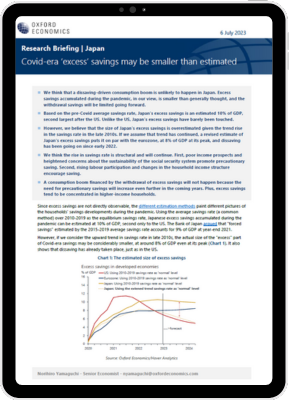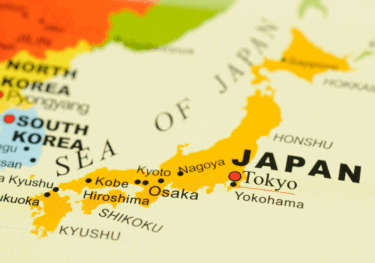Japan: Covid-era ‘excess’ savings may be smaller than estimated

We think that a dissaving-driven consumption boom is unlikely to happen in Japan. Excess savings accumulated during the pandemic, in our view, is smaller than generally thought, and the withdrawal savings will be limited going forward.
Based on the pre-Covid average savings rate, Japan’s excess savings is an estimated 10% of GDP, second largest after the US. Unlike the US, Japan’s excess savings have barely been touched.
What you will learn:
- However, we believe that the size of Japan’s excess savings is overestimated given the trend rise in the savings rate in the late 2010s.
- We think the rise in savings rate is structural and will continue. First, poor income prospects and heightened concerns about the sustainability of the social security system promote precautionary saving. Second, rising labour participation and changes in the household income structure encourage saving.
- A consumption boom financed by the withdrawal of excess savings will not happen because the need for precautionary savings will increase even further in the coming years. Plus, excess savings tend to be concentrated in higher-income households.
Tags:
Related posts

Post
Tariffs and Politics Leave the BoJ Powerless in Japan
The Bank of Japan kept its policy rate at 0.5% at its July meeting. We continue to think the BoJ will exercise caution on rate hikes despite still-high inflation and a recent trade deal with the US.
Find Out More
Post
US-Japan Trade Deal Fails to Shift Japan’s Growth Outlook
We estimate that the US's effective tariff rate on Japanese products is around 17%, in line with our baseline assumption. Lower tariffs on autos are a positive, given the sector's significant contribution to the economy and its broad domestic supporting base
Find Out More
Post
Japan’s Rising Political Instability Will Undermine Fiscal Discipline
The ruling Liberal Democratic party (LDP) and its partner Komeito lost their majority in Japan's upper house elections on July 20. Although Prime Minister Shigeru Ishiba will likely stay to avoid political gridlock, especially to complete tariff negotiations with the US, the political situation has become fluid and could lead to a leadership change or the reshuffling of the coalition.
Find Out More